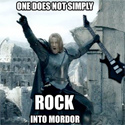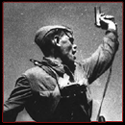|
RobattoJesus posted:This is where I learned the stuff about "grasping" - On a different note, is there a "best" recording of Glenn Gould's Goldberg Variations?
|
|
|
|

|
| # ? May 22, 2024 16:11 |
|
Spider Crusoe posted:I've been playing with my fingers curled, like the way I type with a keyboard. Is that a wrong way of doing things? I looked at some other videos, and it seems like a slightly flatter finger is preferred. I actually have the whole DVD and in the chapters before that he talks a lot about the "skeletal power of an arch" and encourages you to find the point at which your fingers can hold an arch without any effort at all, so while he demonstrates the grasping with flat fingers that's just for showing the grasping movement at the piano. Ideally you should be using that grasping motion, but with curved fingers. There are obviously many schools of thought to this, but the general consensus seems to be curve your fingers unless you're so good that you know when/how to use flat fingers without ruining your technique
|
|
|
|
I have a question I more or less already know the answer to but need confirmation for anyways. To any music majors at a university here, is it annoying for novices to be in the practice rooms? I don't mind playing songs I know, but when I'm learning a new song measure by measure and have to repeat a small chunk for half an hour to an hour, I start feeling like a bother to everyone around me. I can audibly here the violin a room down, and pianos are louder so it's kind of nerve wracking knowing people can so easily hear it. I'm just hoping it's not really a nuisance. I mean, I don't care when other people are stuck on a particular part near me, so I imagine they don't care either but I guess it'd be nice to hear some other music room goons to agree. I miss my digital in my room, but I'm doing research at a different uni this summer, so I'm stuck with the practice rooms and it makes me pretty self conscious when I hear these people who've been playing for 5+ years.
|
|
|
|
ArbitraryC posted:I have a question I more or less already know the answer to but need confirmation for anyways. I`m a 3rd year at Queen`s and a Piano Major. Generally, we are concerned about our own practice, or whatever is going on in our head. If all the rooms are filled and I hear someone practicing chords poorly or something. I normally assume it`s a (instrument other than piano) major working on something for one of our course requirements. Basically, nobody cares. In general though, one thing that I do kind of care about is people not using the piano going into the good piano practice rooms. Normally this is without thinking, but there are some pianos that are well tuned and have a nice keyset. Others don`t. I prefer violin majors and poo poo to use the lovely piano rooms if it`s an option as it doesn`t matter for them. TL;DR: It doesn`t matter man, literally nobody is caring about what your doing. Sometimes my friends remark on another in a practice room near them and I lightly and slightly remind them that it doesn`t create a healthy environment to do so.
|
|
|
|
I found a link to the following facebook sight reading app this morning, which seems awesome: http://apps.facebook.com/readpianonotes/index.php I have a couple of sight reading apps for my iPhone, but they all sucked because you could only do one staff at a time, and they never ventured too far into ledger lined notes, whereas this one seems great (if it did MIDI input it would be perfect). So far I'm a "Skilled Sightreader"
|
|
|
|
So, I found someone to teach me piano at a pretty decent rate, and she told me that she's only accepting students from 8-15 right now. Is this common, and can you think of any reason for it?
|
|
|
|
bairfanx posted:So, I found someone to teach me piano at a pretty decent rate, and she told me that she's only accepting students from 8-15 right now. Is this common, and can you think of any reason for it? How old is she herself and to what level has she studied music? That's really the only reasonable areas, otherwise it's odd.
|
|
|
|
bairfanx posted:So, I found someone to teach me piano at a pretty decent rate, and she told me that she's only accepting students from 8-15 right now. Is this common, and can you think of any reason for it? Because she has an age group/distribution she likes teaching? Just like some people prefer to be middle school teachers instead of high school teachers (even though there's no meaningful difference in education), it's often a temperament question more than anything else.
|
|
|
|
Man, if I was teaching and had the luxury of rejecting students based on age I would just not take anyone under 25 or something. Adult students rule, they pay their own money for the lessons and don't (usually) have temper tantrums and also are less likely to break their arms playing field hockey or something.
|
|
|
|
Bob Shadycharacter posted:Man, if I was teaching and had the luxury of rejecting students based on age I would just not take anyone under 25 or something. Adult students rule, they pay their own money for the lessons and don't (usually) have temper tantrums and also are less likely to break their arms playing field hockey or something. They are, however, more likely to quit.
|
|
|
|
Alizee posted:How old is she herself and to what level has she studied music? That's really the only reasonable areas, otherwise it's odd. Mid-30's, and I'm not quite sure, but she's been teaching for some time now (~8 years, I think). I get the "preferring a certain age group," but I just don't understand why that would cause you to turn down money when you have open time slots. Ah well, the hunt continues. bairfanx fucked around with this message at 16:03 on Jun 30, 2010 |
|
|
|
tbradshaw posted:They are, however, more likely to quit. Are they? Huh. My teacher has this stable of older students (I mean some of them are legit elderly) who have been with him forever. But my perspective might be skewed because I only see these particular students and they are the ones he invites to piano parties at his place so maybe they're the only ones that stick around long enough.
|
|
|
|
Alizee posted:Does anyone have experience with a Triton Extreme that can help me with some band/gig related things I need to do with it. Super late on this but I had an Extreme for years, PM me if you still need help.
|
|
|
|
If I'm playing a song in Gb and the score indicates a Dbb do I play a C or B?
|
|
|
|
RobattoJesus posted:If I'm playing a song in Gb and the score indicates a Dbb do I play a C or B? You play a dbb! It's a C. Took me a minute to figure out the confusion, but they don't add flats on top of flats in the key signature, that would be too cruel.
|
|
|
|
Bob Shadycharacter posted:You play a dbb! Thanks, that's what I thought but both notes sounded ok so I was a little confused (infact I prefer the B  ). ).When I think about it now of course that makes perfect sense though, if it had said D# I wouldn't have played a D because of the Db in the key signature.
|
|
|
|
What piece is it? I totally remember having a moment like that some years ago too. "Wait, wait - it's already supposed to be flat so...wait".
|
|
|
|
I've been learning for about four months and I'm almost done with the second book of Adult Piano Adventures by Nancy and Randall Faber. I don't think there's a third book. Where should I go next?
|
|
|
|
Bob Shadycharacter posted:What piece is it? Heh I love seeing really weird accidentals. Bach's Prelude in F# major has a G## (trilled!), which is the oddest one I can think of offhand. I feel like I've played a Chopin piece with a Dbb, maybe the sixth Etude opus 10? Wild Bill posted:I've been learning for about four months and I'm almost done with the second book of Adult Piano Adventures by Nancy and Randall Faber. I don't think there's a third book. Where should I go next? I wish there was a list for stuff like this, but it's all pretty subjective anyway. Ideally you'll want something anywhere from slightly to fairly challenging, but I don't know the technical level of that book. I'd grab one of those classical music anthology books, maybe a 'light' or 'beginner' level one, but try to avoid simplified versions. Hopefully you'll find stuff you like and stuff you can learn from, maybe both. If you find a composer whose work is a good fit, there are lots of places online with public domain scores.
|
|
|
|
Bob Shadycharacter posted:What piece is it? Oh You Pretty Things by David Bowie (I've got his best of book which is huge and like to use it for sight reading practice, hence why whenever I'm asking a question it's usually about a Bowie song :P) The measure it's in plays a Gb Major over a Db in the root, but leads into a Cb7 by replacing the Db with a Dbb an octave higher in the root for the last chord (8ths in the RH, halfs in the LH). It sounds like crap to my ears, the B is not much better but at least that makes a major 9th. I'm not playing up to speed though, which is usually the cause of a lot of my "hrm, that sounds crap" moments, as it usually ends up sounding fine at speed when it's "in context"
|
|
|
|
Oh yeah, there's a big difference sometimes between the initial strike of a chord and how it sorts itself out later. When tuning you have to play each interval and let it ring for at least a second (doesn't sound long but compared to how long most chords last in actual playing it kinda is). I like weird notation in general. I'm playing a Debussy piece right now that starts out in 6/8 and then the second measure has a 9/8 in parenthesis and then it goes back to 6/8 right after that. And pretty much the whole thing is written on three staves intsead of two.
|
|
|
|
Has anyone ever purchased anything from bhphotovideo.com? I found a keyboard that I'm looking to buy and it's cheaper than anywhere else. This will be my first instrument and I don't wanna spend money on lovely service.
|
|
|
|
^^ A quick search seems to suggest a reasonably high rating. Use a credit card and enjoy your purchase. If things go crazy wrong you can always issue a chargeback. Plus, if something breaks after the first month or so you'll have to take it up with the manufacturer anyway.
|
|
|
|
bairfanx posted:Mid-30's, and I'm not quite sure, but she's been teaching for some time now (~8 years, I think). I get the "preferring a certain age group," but I just don't understand why that would cause you to turn down money when you have open time slots. The majority of piano teachers with cards on the wall of my local music store either won't accept adults or won't accept males. Maybe a lot of them are women and worry about being alone with males but goddamn.
|
|
|
|
I ended up buying some piano repertoire and etude books from the Royal Conservatory of Music. Are the songs arranged in any particular order for the early levels? I don't know if I should start from page one or just pick what looks easiest first.
|
|
|
|
I can play legato and staccato fine, but what about notes that aren't marked? Here's an example: The second measure has some notes with slur marks, but the other notes don't. Is there something between legato and staccato? My attempts at something like that haven't sounded too good. Example 1 - Here I played it all legato, which I don't think would be right. Example 2 - Here I played legato, but with breaks right before when the slur marks occur. Example 3 - Here I tried not being legato, except with the notes affected by the slur marks. Am I in the right direction with this?
|
|
|
|
Example 3 is the most accurate. In the type of music you're playing, non-marked notes should default towards light staccato. Eventually you'll get used to seeing a composer or a time period/location (or in this case, pretty iconic rhythm and note patterns) and know what the "default" articulation is.
|
|
|
|
Hawkgirl posted:Example 3 is the most accurate. In the type of music you're playing, non-marked notes should default towards light staccato. Eventually you'll get used to seeing a composer or a time period/location (or in this case, pretty iconic rhythm and note patterns) and know what the "default" articulation is.
|
|
|
|
Spider Crusoe posted:I ended up buying some piano repertoire and etude books from the Royal Conservatory of Music. Are the songs arranged in any particular order for the early levels? I don't know if I should start from page one or just pick what looks easiest first. Nope, RCM books have songs arranged by period of composition only. All pieces in a given book can be assumed to be approximately the same level of difficulty (give or take your personal comfort levels with specific techniques that may come easier/harder like strange key signatures, octaves, etc)
|
|
|
|
Bob Shadycharacter posted:I think everyone should play Bach but I'm totally biased. It's a totally different style of music from Mozart or Beethoven or Chopin and it's very good to have some background in contrapuntal style. I'm fairly new to piano and over the last few days I've been obsessively learning Bach's Prelude from Cello Suite No.1: http://www.youtube.com/watch?v=dZn_VBgkPNY It sounds gorgeous on piano but I wouldn't recommend it to beginners. It's not that hard to play (even using one hand through most of it,) it's confusing to learn some of the parts where it stops being "songy" for a few sections and goes into classical wankery. I love those parts too, but without controlling the tempo and volume it just sounds like random notes for a little while. Listen to 0:30 - 0:40 in that video I posted. It takes a lot of listening to the video, and then looking back and figuring out how to play the notes on the sheet music. So some parts are hard to transcribe into actually playing yourself from sheet music.
|
|
|
|
I think it's pretty important to understand that not everything that is written on a staff is going to sound good. I mean, if you think about it, how many people do you know list classical piano as their favorite genre of music? Personally, I adore Chopin and Liszt, but I don't really care for Bach or Prokofiev. Yuck. I'm amazed someone like Kissin goes from Liszt to Prokofiev instead of writing his own music or even expanding to other instruments like synth, but I guess it has a lot to do with what his teachers tell him and with what orchestras want to play. But honestly, with that kind of technical mastery, you could tear a synth apart. I'm more into exploring new styles myself and I don't really care to be analyzed by idiot critics with my interpretation of Chopin pieces. Besides, there are already recordings of those pieces played to near perfection if I really want to listen to them, and when it comes to Chopin, I do, often  Pianos are rather expensive and difficult to move, so they might not be even worth buying with the alternatives that are available. It seems like a few people in this thread are wondering if they should buy a piano or a digital keyboard. I would say you should almost always go with the digital piano for your home unless you are just ridiculously rich. The Casio Privia is a nice choice for like 500$. If you're willing to spend 2,000$, I would go with something by Roland like the RD-700. I don't really like Yamaha products very much, but they use the same technology. You're never going to get the same kind of sound and feel for fast trills and techniques of that like that you can get on something like a D-series, but those pianos are 145,000$ new. Anything short of a Steinway D is going to have some kind of flaw. Baby grands and uprights always have some poor sounding bass notes. Pianos are also expensive to maintain and get out of tune pretty quickly. If you can afford it and also want an extra desk, then by all means, buy a piano, they look classy in your mansion, you s.o.b. Here are the major keys for noobies: The piano often produces multiples of 12. 1. C major/A minor : C, D, E, F, G, A, B 2. C# or Db major/A# or Bb minor : C#, D#, F, F#, G#, A#, C 3. D major/B minor : D, E, F#, G, A, B, C# 4. D# or Eb major/C minor : D#, F, G, G#, A#, C, D 5. E major/C# or Db minor : E, F#, G#, A, B, C#, D# 6. F major/D minor : F, G, A, A#, C, D, E 7. F# or Gb major/D# or Eb minor : F#, G#, A#, B, C#, D#, F 8. G major/E minor : G, A, B, C, D, E, F# 9. G# or Ab major/F minor : G#, A#, C, C#, D#, F, G 10. A major/F# or Gb minor : A, B, C#, D, E, F#, G# 11. A# or Bb major/G minor ; A#, C, D, D#, F, G, A 12. B major, G# or Ab minor : B, C#, D#, E, F#, G#, A#
|
|
|
|
androo posted:DIt sounds gorgeous on piano but I wouldn't recommend it to beginners. It's not that hard to play (even using one hand through most of it,) it's confusing to learn some of the parts where it stops being "songy" for a few sections and goes into classical wankery. I love those parts too, but without controlling the tempo and volume it just sounds like random notes for a little while. Listen to 0:30 - 0:40 in that video I posted. It takes a lot of listening to the video, and then looking back and figuring out how to play the notes on the sheet music. So some parts are hard to transcribe into actually playing yourself from sheet music. 
|
|
|
|
androo posted:
Good god that is amazing.
|
|
|
|
pennywisdom posted:Good god that is amazing. Listen to these: http://www.youtube.com/watch?v=bTxs5FUXdQA http://www.youtube.com/watch?v=mFAPVSbKh7I http://www.youtube.com/watch?v=CXyo79e9xoM&feature=related http://www.youtube.com/watch?v=GOe670xcKhk Hmm, not the cello. This is pretty cool. http://www.youtube.com/watch?v=eW_MAQj0aIA Monti fucked around with this message at 06:46 on Jul 7, 2010 |
|
|
|
Organ music is sposed to be played on organ but noone told Liszt  http://www.youtube.com/watch?v=c71soZNePz4&feature=related
|
|
|
|
Does anyone have any tips for becoming really good at (cold) sight reading? Particularly when sight reading in keys other than C major / A minor. I know all my scales and can play them all without looking and can visualise the shape of each scale in my head, but for some reason when it comes to sight reading I end up playing all the white keys or having to mentally check every note with the key signature which slows me down massively. I think I might need to cement the keys "absolutely"? I.e. when I sight read, I'll look at the first note and go "ahh that's a C" then look at the next one and see that it's a 3rd up, and play that, but never really think of it as an E, which is probably why I get so screwed over by key signatures. Should I begin by saying the notes before playing them (just until I always "know" what key I'm playing")? Also does anyone know where to get a bucketload of super simple sheet music? Even if I have to pay, or it all sucks, I just want loads because while I can learn and perfect even fairly complex pieces, I can only cold-sightread at tempo really easy pieces, and I'm finding that super-novice pieces are actually fairly hard to find. (and my girlfriend keeps shouting at me for sight reading Christmas songs in July  ) )
|
|
|
|
Monti posted:Pianos are rather expensive and difficult to move, so they might not be even worth buying with the alternatives that are available. It seems like a few people in this thread are wondering if they should buy a piano or a digital keyboard. I would say you should almost always go with the digital piano for your home unless you are just ridiculously rich. The Casio Privia is a nice choice for like 500$. If you're willing to spend 2,000$, I would go with something by Roland like the RD-700. I don't really like Yamaha products very much, but they use the same technology. You're never going to get the same kind of sound and feel for fast trills and techniques of that like that you can get on something like a D-series, but those pianos are 145,000$ new. Anything short of a Steinway D is going to have some kind of flaw. Baby grands and uprights always have some poor sounding bass notes. Pianos are also expensive to maintain and get out of tune pretty quickly. If you can afford it and also want an extra desk, then by all means, buy a piano, they look classy in your mansion, you s.o.b. Uh, I don't want to argue or anything, but this is kinda ridiculous. If you want a real piano then you buy one, there are good quality upright pianos that aren't massive and don't cost a shitton of money - especially compared to the more expensive keyboards - and no, not all uprights have lovely sounding base notes! I happen to have a very nice Yamaha upright that cost $3000 new and sounds loving fantastic and I would rather play that than any keyboard that exists in the world. I agree that "Baby" grands are a waste of money, they have shorter base strings than most normal sized uprights so it's kind of ridiculous. I don't think $200 a year to keep it in tune is that much money, and I certainly wouldn't call myself a rich SOB? I don't have an issue with people buying a keyboard instead but a keyboard is not a piano and will never be a piano - it's a keyboard. For the same reason a harpsichord is not a piano and an organ is not a piano so you wouldn't buy one of those if what you wanted to learn was...piano. And I don't care how fantastic the sampling is it isn't ever going to sound exactly the same.
|
|
|
|
I think there is a lot to be said for only having yourself and your piano. I love digital pianos, but sometimes I'll go to play and think it sounds a bit off, so I'll check the speakers, hook up pianoteq, tweak with the patches, and so on and end up spending half my practice time loving about. If I had an acoustic you don't worry about the sound because you can't change it, the only thing to do is play it.  Plus I probably spend at least $200 a year on sample sets / software / midi crap, not to mention the fact that when you buy a DP they always release a newer model a year or so later that makes you want to blow another $2000. 
|
|
|
|
RobattoJesus posted:Does anyone have any tips for becoming really good at (cold) sight reading? Particularly when sight reading in keys other than C major / A minor. I think you just need to sightread in a lot of different keys. You get to the point where your see a key signature and your hands automatically go for the accidentals without having to think about it, so in C minor you'll go "ah that's a C" and then see the E and your finger automatically goes up a minor third. I don't think that's what you mean by "absolutely" knowing the key, but it works for me. Basically just sightread a lot of different stuff and you'll start improving. Yeah definitely start out with easier pieces; I think the biggest gains I made sightreading were with Bach. You can always print out the 2 and 3 part inventions here, but I'd recommend getting a copy. Work up on the two part inventions, then you can move on to French and English suites and eventually the Well Tempered Clavier, which pretty much takes care of every key you'll ever run across.
|
|
|
|

|
| # ? May 22, 2024 16:11 |
|
I find some of the English Suites especially to be 10x more manageable than the two-part inventions. Or the 'Little' Preludes and Fugues, don't forget about those. The C minor one is really easy and rocks face
|
|
|






















